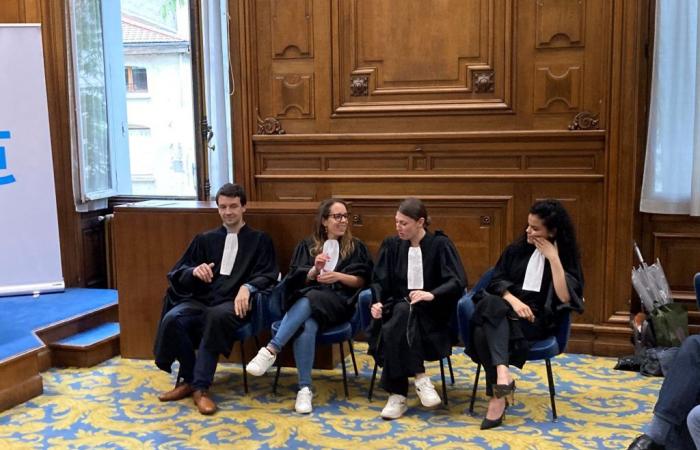Thursday, June 20, at the Maison des lawyers of Saint-Étienne, in a slight effervescence, it was the big night. For the first time, a pleading competition, intended for young lawyers with less than five years of practice, brought together four “candidates” and supporters, as well as a confirmed jury. The exercise, intended to unite the bar, already achieved its objective.
“This allows all generations to meet and the older ones to discover certain talented members of the young bar, and to highlight them.details M.e François Paquet-Cauet, president of the Saint-Étienne bar. And then, pleading is still in the lawyer’s DNA, it is always important, even if there are less and less of it.”
In fact, the profession has had to adapt, with judges expecting more from written conclusions.A plea takes up court time, and unfortunately given the lack of resources allocated to justice, judges do not have much time, and pleas are sometimes reduced due to material contingencies. Nevertheless, pleading remains an important aspect of the legal profession and our practice..”
Combine substance and form
Four subjects were proposed on themes related to the profession or public freedoms. While two modalities are possible in this type of competition, pure eloquence with somewhat artificial subjects for pleadings that are pleasant to listen to and “funny”, and more specialized subjects, the president of the president has chosen to combine the substance and the form, as with “The prisoners, forgotten by freedom”, a theme defended by Me Cathy Giraud. On the other hand, “Is the lawyer the beggar of humanity?” convinced two young lawyers.
© Stéphanie Véron – The four lawyers candidates for the moot court competition.
Me Paul Chargelegue considered that the lawyer cannot be forced to beg her, because “humanity cannot be compromised, it imposes itself or, failing that, demands itself because if science without conscience is only ruin of the soul, then justice without humanity is only tyranny.“Why have we come to doubt,” he asks, referring back to back, “the role of the legislator in the complexity of laws, fueling by his vehemence public opinion which demands vengeance, the weak means of justice with the corollary “the lack of time to reason forcing you to spare your efforts. Profitability that cultivates insensitivity and conviction“while doubt must prevail. Considering that”humanity is reduced to few things“, Me Paul Chargelegue ultimately believes that “lawyers must be the guarantors.”
For his part, Me Sarah Theillière, pleading on the same subject, questioned her role in society. Would she be a beggar or a lawyer, and what to beg? “Delays, dismissals, sentence reductions, a certificate of end of mission, fees… begging for humanity or for humanity… begging for a group of human beings or begging for understanding, compassion, and providing help to those who need it?“Drawing a parallel between the beggar and his profession after having defined each, she concluded her plea on the risk of begging on the public highway or near the courts, with humor and irony, relying on reference articles from the penal code, the sometimes somewhat surreal character of which she indirectly underlined.
“To plead is to jump into the void”
Finally, Me Halima Mellouki wondered how to judge far from emotion and immediacy. By choosing “Public opinion, chase away this intruder, this prostitute who pulls the judge by the sleeve”, she highlights the difficulty in judging when “lurking in the shadows, the dark public opinion, armed with trolls behind their worn keyboards, types, strikes, delivers its truth, insensitive to nuance and doubt“The judge must protect himself from this”outside tumult […] to do justice in the name of the people and not for the people, […] with only his dignity, his integrity and his humanity as lifelines.“Considering in conclusion that it is courageous to judge.
After deliberating, the jury highlighted the quality of the pleadings, all the more aware of the work they require alongside daily work. “To plead is always to jump into the void. It takes a lot of courage to plead, and even more courage to plead before a jury like ours“, testified M.e François Paquet-Cauet, at the end of the competition. Unanimously, the jury awarded Me Sarah Theillière, followed by Me Paul Chargelegue and ranked ex-aequo in third position Me Mellouki and Me Giraud.
This event opened the door wide to the national competition of the Conference of the Grand Oath organized by the Conference of Presidents. Which will take place next fall in Libourne, with the representative of the Saint-Etienne bar, Me Sarah Theillière.
The members of the jury
This first pleading competition brought together a confirmed jury composed in addition to the president of the bar Me François Paquet-Cauet, of Me Olivier Bost, former president of the bar, Me André Buffard, François-Xavier Manteaux, president of the judicial court of Saint-Étienne, Me Jihène Gazdalli and Me Coralie France.






